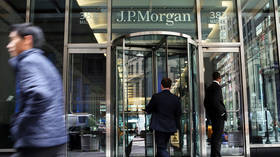Ukraine accuses top Western banks of 'war crimes'

Major global banks, including JPMorgan Chase, HSBC, Citigroup and Credit Agricole, are “committing war crimes” by financing companies that ship Russian oil, a top Ukrainian official has said.
In an interview with the Financial Times, parts of which were published late on Friday, Oleg Ustenko, economic adviser to Ukrainian President Volodymyr Zelensky, claimed that the financial institutions were guilty of “helping the Putin regime in this specific way,” referring to trade in Russian hydrocarbons. The revenue, in turn, is allegedly being used to fund Moscow’s offensive against its neighbor, Kiev claims.
The official also told journalists that Ukraine’s Ministry for Justice is going to sue the banks at the International Criminal Court once the conflict is over. Ustenko pointed out that Kiev’s security services are keeping tabs on those lenders, which are supporting Russian fossil fuel trade.
According to the FT, earlier this week the presidential adviser sent letters to the CEOs of JPMorgan Chase, HSBC, Citigroup and Credit Agricole, in which Ustenko urged the financial institutions to stop providing credit to companies that trade Russian oil and sell shares in state-backed oil and gas groups Gazprom and Rosneft.
The Ukrainian official reportedly accused the banks of “prolonging” the conflict and warned they would not be allowed to take part in the postwar reconstruction of Ukraine.
The letters reportedly stressed, among other things, that HSBC’s and Credit Agricole’s asset management arms still hold shares in Gazprom and Rosneft, Russia’s state oil and gas firms. Citigroup allegedly provides credit facilities to another Russian oil and gas giant, Lukoil, as well as to Vitol, a Dutch energy company that trades in Russian oil, according to the letters seen by the FT.
JPMorgan Chase is another global bank that extends credit lines to the Dutch trader, Ustenko reportedly claimed. On top of that, Kiev believes that the lender still holds stakes in Russia’s largest majority state-owned bank, Sberbank, as well as Gazprom and Rosneft, which were all described in the letter as some of the Kremlin’s most valued economic assets.
In early July, JPMorgan Chase warned that attempts to impose a price cap on Russian oil could see global prices rise to a “stratospheric $380/bbl.”
In his letter to the bank’s CEO, Jamie Dimon, Ustenko insisted that JPMorgan Chase’s assessment was nothing more than “scaremongering, based on poor quality analysis,” the FT reported. The Ukrainian official also allegedly berated Dimon for referring to the situation in Ukraine as a mere “crisis.”
In a subsequent statement, JPMorgan Chase argued that it has “diligently” and actively implemented all Western sanctions against Russia.
Citigroup and Credit Agricole, while not responding directly to the Ukrainian official’s letters, reiterated statements they had issued before about suspending and paring back activities in Russia. HSBC declined to comment.
Privately, bankers revealed to journalists, however, that it has proven impossible to divest some of their Russian holdings because of the sanctions and other restrictions already in place.
Vitol, a Dutch energy trader whose name cropped up more than once in Ustenko’s letters, pointed out that it had cut its Russian oil business by 80% since late February, with the remaining volumes in full compliance with Western sanctions.













